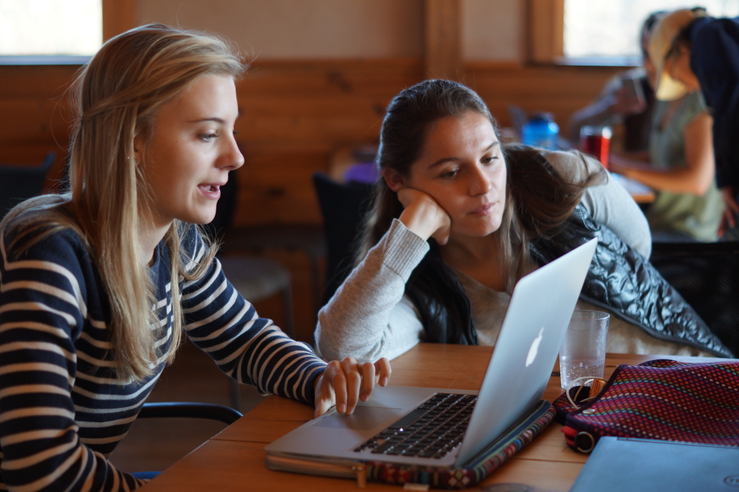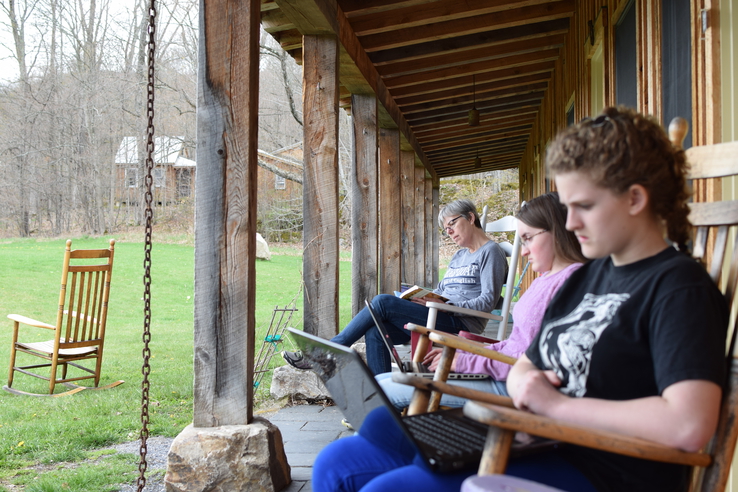
#2 Not An Ideal World
In an ideal world, picking a social issue to study would be difficult because there would be too few to even choose from. Unfortunately, this is 2017 and there are still more issues to be addressed than there are seconds in the day. And, being a person that cares a little too much about everything, picking just one issue to discuss appeared to be nearly impossible. So, I enlisted the help of some of the most influential people in my life to tell me about the issues they wish they could fix.
First, I talked to one of my old middle level teachers, and former WTS parent, Bill Fishell. Initially, we discussed the importance of cross-cultural communication between younger students, especially in rural areas like Morrisville. When he told me about the discussions middle level students in his class had had with other students from around the world, I was astonished. Though I hadn’t given it much thought, this issue really hit home for me; I thought back to my own exchanges in France and the positive impact they had made on my life. I realized that not every student gets opportunities like that, but they should.
We also talked about water quality in parts of Vermont like Enosburg and Burlington where lakes are experiencing eutrophication at an alarming rate. We talked about the undeniable connection between poor water quality and agriculture. This issue is something I’ve been interested in for some time, but approaching it without any kind of platform would be difficult. Now, however, I have the resources and guidance to potentially pursue this problem.
Lastly, he mentioned handicapped accessibility in Vermont. Mr. Fishell brought up a good point; Vermont prides itself on being a very aware place but because parts of our state are so rural, the accessibility we have might not be as advanced as we think.
That night, I went over to talk to my neighbor, Penny Ducharme. When I asked her what she would change if she had unlimited resources, she quickly responded, “universal, high quality child care”. She talked about not only the social, but undeniable economic benefits; there is research that correlates a rich pre-k experience with decreased incarceration, and paying for quality daycare costs less than jail time. The idea Penny was getting at is that we need to start “investing in our people” instead of placing the blame anywhere but on ourselves.
Something else Penny brought up really struck me. “In our lives, we each try our best to make the changes we can but one single person can’t fix everything”, so she’s always focused on helping people because that’s what she knows. Environmental issues are daunting because all we are told to do is “recycle and try to turn off the lights”. When it comes down to it, people who want to help don’t always know how to solve the overwhelming issues so they do their best not to think about them. That itself is an issue that needs to be changed.
Finally, I talked to my former AP Environmental Science teacher, Sheila Tymon. Immediately, she answered my question with “habitat loss and sustainable development” and how those can be resolved through education and awareness. Then, I asked her about the same topic Mr. Fishell brought up: eutrophication of lakes in Vermont. Not only will this issue hurt the tourist industry in Vermont but the health and livelihood of the people who live here. Environmental issues are truly what I am passionate about and I think this particular one could be approached in many different ways, but it would take much more than “awareness” to solve.
These interviews definitely gave me some direction and I loved hearing the honest opinions of people I really value. I’m excited to see where this investigation leads, but I know that it still won’t be easy to focus on one single issue.
Image Citation
Platt, Rita. “Let’s Talk About It! Facilitating Whole-Class Discussions.” Professional Development for Teachers Who Are Also Learners, We Teach We Learn, 30 May 2016, www.weteachwelearn.org/2016/05/lets-talk-about-it-facilitating-whole-class-discussions/.
 Previous Post
Previous Post Next Post
Next Post







Rachael,
What a pleasure to hear about your interactions with three people I know and respect! One way to invest in our future would be to surround young people with adults who model intelligence, compassion, and hard work. Looks like you’re the product of just such an arrangement.
I enjoyed hearing you considering all these different topics, each worthy of exploration. Having watched students work through this process for a few years now, I’ve come to respect how important it is for students to consider two things when determining what topic to dig into. First, it helps a whole lot if the topic elicits strong feelings from the learner. Second, it’s important that the topic is one the student can gain access to / make some progress with. For example, last year some students were considering the issue of gender pay inequality and felt strongly about it (check), but it became clear as they began exploring the topic that they didn’t have much experience with the issue or access to the topic in a way that they could make some progress with. So, they decided to focus on gender bias in schools, a related issue, but one alive and well right where they spend a lot of time.
The topic of “cross cultural communication” between students jumped out at me, partly because I spent a few days this summer with students / educators from 6 states who are all engaged in local social action (here’s a video that captures that story: http://www.madrivermedia.com/BLTNNextGen11Minutes22Seconds.html). What became clear is that each state has its own culture, yet still the students all had a lot of common concerns and passions. If after watching this video you’re interested in maybe exploring cross-cultural connections with any of these students / places, let me know and we can explore that. (But please feel no pressure to go this way; I’m just spitballing here.)
Finally, yes the world we live in today sure isn’t lacking for social action options, though I sometimes think swells of current challenges can prevent us from seeing larger patterns of positive change. As rough as our world is today, things are actually a lot better around the world in many ways.
So glad I made the trip up to PA last year to meet with you and Aidan. I still get up there regularly (especially Mondays), so glad to make time to meet on site, when/if that might be helpful to you.
Take care,
Bill Rich
Hi Rachael,
Each of the topics you wrote about are so different yet all so interesting. The topic of cross cultural communications is somewhat similar to my topic on refugees and them integrating into society. The environmental issues I definitely think deserve some attention in Vermont. I like how you mentioned that “awareness” doesn’t solve issues. I totally agree and I thin that that will be an issue for most topics because many are so big that there isn’t a quick solution. Curious which topic you will end up choosing!
-Neva